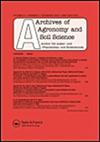Poly-γ-glutamic acid enhances the wheat yield, water use efficiency and soil physicochemical properties of the arid area in the Northwest China
IF 1.8
4区 农林科学
Q1 AGRONOMY
引用次数: 2
Abstract
ABSTRACT Poly-γ-glutamic acid (γ-PGA) is an environment-friendly super absorbent polymer that can be used as a soil conditioner, which is promising to improve crop productivity and cope with soil degradation. The objectives of this study are to study the effects of γ-PGA on soil physicochemical properties and winter wheat (Triticum aestivum L. cv. Xinong 975) production in arid region of Northwest China. According to the mass ratio of γ-PGA and soil, experiment treatments consisted of four different γ-PGA application rates, which were designated as 0 (CK), 0.05% (P0.05), 0.1% (P0.1), and 0.15% (P0.15), respectively. The mixed soil samples were uniformly filled into identical plastic pots. Each treatment had three replicates randomly distributed within 12 pots. The results indicated that γ-PGA significantly increased saturated water content by 6.3-11.5%, field capacity by 8.4-15.3%, and plant available water by 5.1-12.5% compared with the CK. γ-PGA increased soil NO3 −-N content and residue, and enhanced the proportions of soil macro-aggregates compared with the CK. γ-PGA increased winter wheat yield by 29.3-34.7%, and WUE by 21.2-33.3% compared with the CK. The main conclusion γ-PGA application amount of 0.05-0.1% can be used to improve soil physicochemical properties and winter wheat production in degraded soil.聚γ-谷氨酸提高西北干旱区小麦产量、水分利用效率和土壤理化性质
聚γ-谷氨酸(γ-PGA)是一种环境友好的高吸水性聚合物,可作为土壤调节剂,有助于提高作物生产力和应对土壤退化。本研究旨在研究γ-PGA对西北干旱区土壤理化性质和冬小麦产量的影响。根据γ-PGA与土壤的质量比,试验处理包括四种不同的γ-PGA施用率,分别为0(CK)、0.05%(P0.05)、0.1%(P0.1)和0.15%(P0.15)。将混合的土壤样品均匀地填充到相同的塑料盆中。每个处理有三个重复,随机分布在12个盆中。结果表明,与对照相比,γ-PGA显著提高了饱和含水量6.3-11.5%,田间持水量8.4-15.3%,植物有效水5.1-12.5%。γ-PGA提高了土壤NO3--N含量和残留量,提高了土壤大团聚体比例,γ-PGA施用量0.05-0.1%可改善退化土壤的理化性质和冬小麦产量。
本文章由计算机程序翻译,如有差异,请以英文原文为准。
求助全文
约1分钟内获得全文
求助全文
来源期刊

Archives of Agronomy and Soil Science
AGRONOMY-SOIL SCIENCE
CiteScore
5.50
自引率
4.20%
发文量
107
期刊介绍:
rchives of Agronomy and Soil Science is a well-established journal that has been in publication for over fifty years. The Journal publishes papers over the entire range of agronomy and soil science. Manuscripts involved in developing and testing hypotheses to understand casual relationships in the following areas:
plant nutrition
fertilizers
manure
soil tillage
soil biotechnology and ecophysiology
amelioration
irrigation and drainage
plant production on arable and grass land
agroclimatology
landscape formation and environmental management in rural regions
management of natural and created wetland ecosystems
bio-geochemical processes
soil-plant-microbe interactions and rhizosphere processes
soil morphology, classification, monitoring, heterogeneity and scales
reuse of waste waters and biosolids of agri-industrial origin in soil are especially encouraged.
As well as original contributions, the Journal also publishes current reviews.
 求助内容:
求助内容: 应助结果提醒方式:
应助结果提醒方式:


